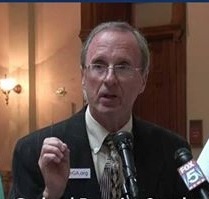8. On August 7, 1861 as the legislature adjourned, Lincoln's federal troops arrested and imprisoned for years without trial members of the legislature who were known to favor neutrality or secession
9. Those imprisoned at Fort McHenry, Point Lookout or Fort Lafayette included 30 state legislators, a U.S. Congressman, Baltimore police commissioners, most City Council members and Mayor George W. Brown
10. Also at that time in 1861, Lincoln began imprisoning hundreds of newspaper editors or publishers including Baltimore Exchange editor, Francis Key Howard, grandson of "The Star Spangled Banner" author
11. The Baltimore riots, imprisonment of legislators and federal occupation inspired James Ryder Randall to write the lyrics that document these dilemmas in what is now the state song, "Maryland, My Maryland"
12. On May 25 1861, John Merryman, who became the Maryland state treasurer, was arrested while carrying out orders from Gov. Hicks to block northern bridges so that the Union army could not enter Maryland
13. Merryman petitioned the U.S. Supreme Court for a Writ of Habeas Corpus. Chief Justice, Roger Taney, agreed to hear his case but General George Cadwalader refused to bring Merryman and appear in court.
14. Chief Justice Taney then issued his legendary opinion, entitled ex. Parte Merryman, that emphatically states how the President and the General had overstepped U.S. Constitutional bounds
15. Abraham Lincoln responded by giving Ward Hill Laman, federal marshal for the District of Columbia, an arrest warrant for Chief Justice Taney. According to Laman, Lincoln told him he could use his discretion in deciding to make the arrest unless he received further orders. Laman decided not to carry out the order
(Note: You can view every article as one long page if you sign up as an Advocate Member, or higher).





